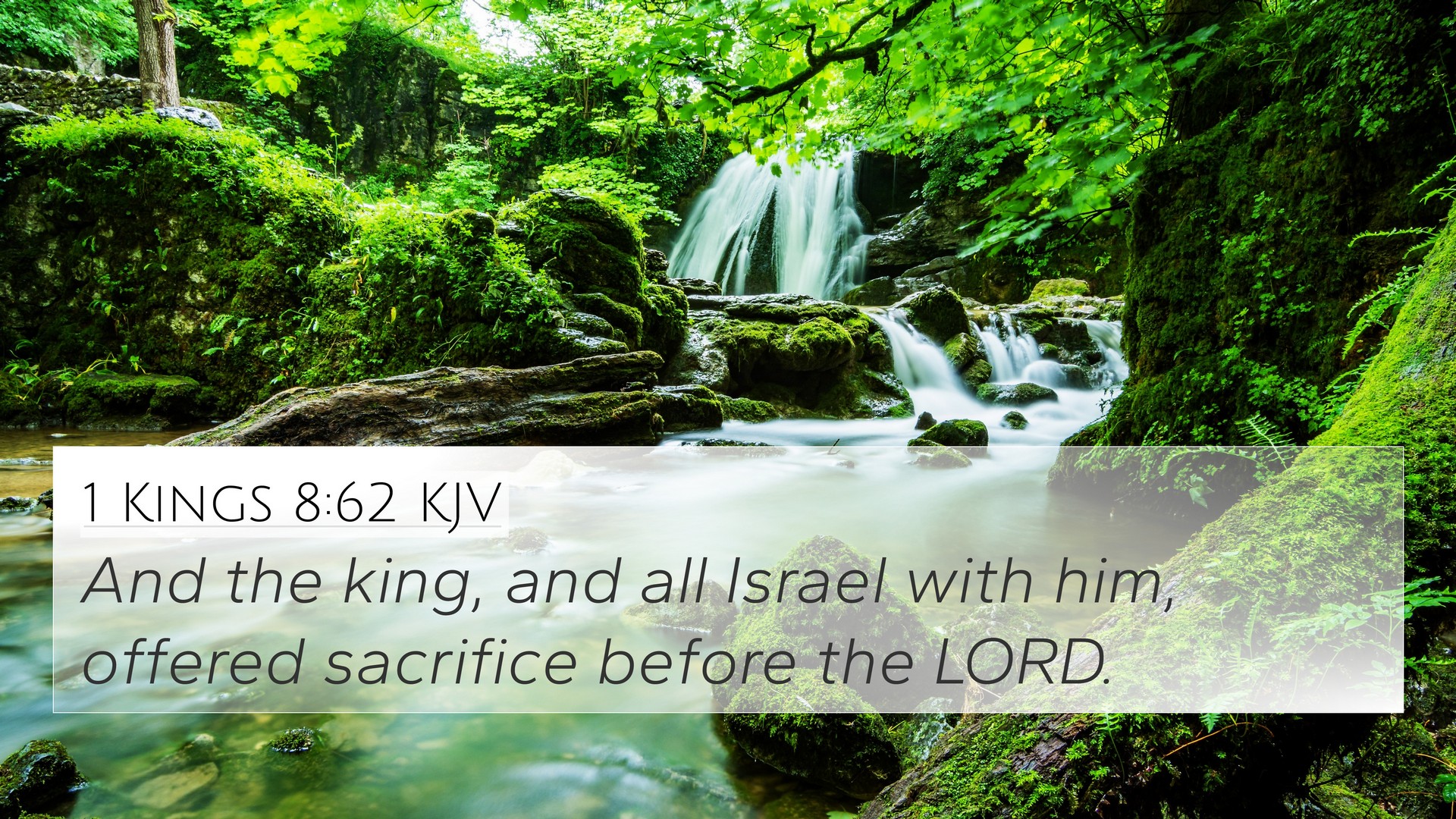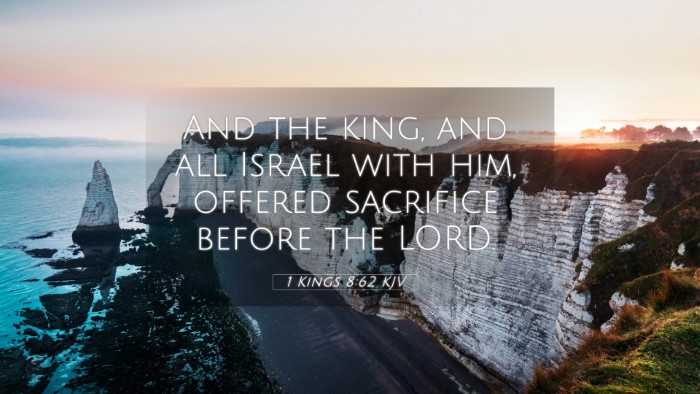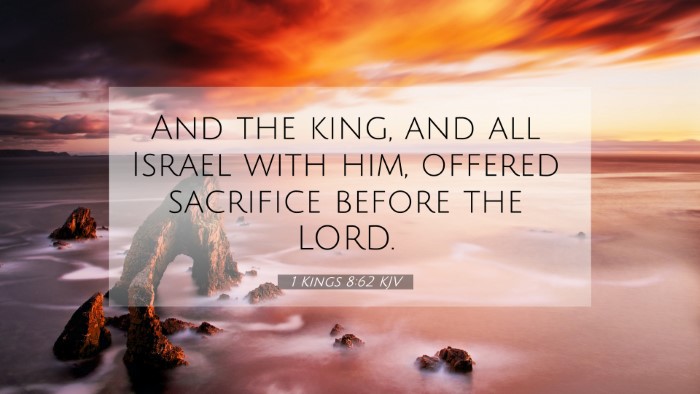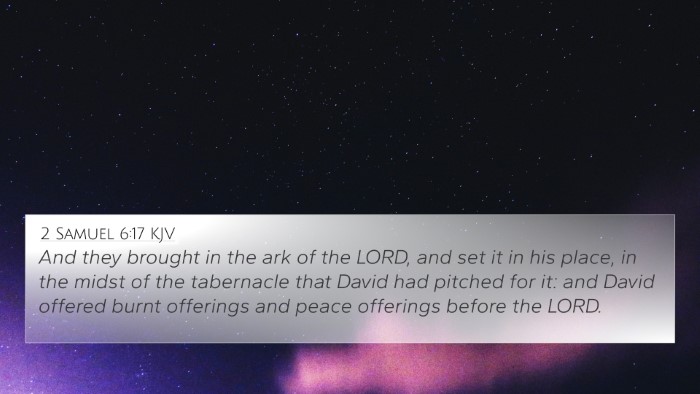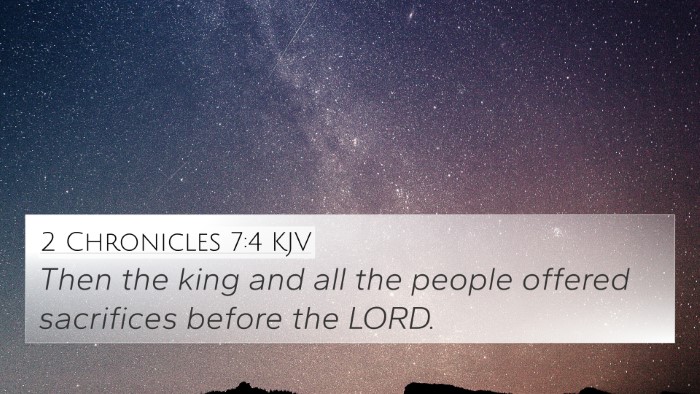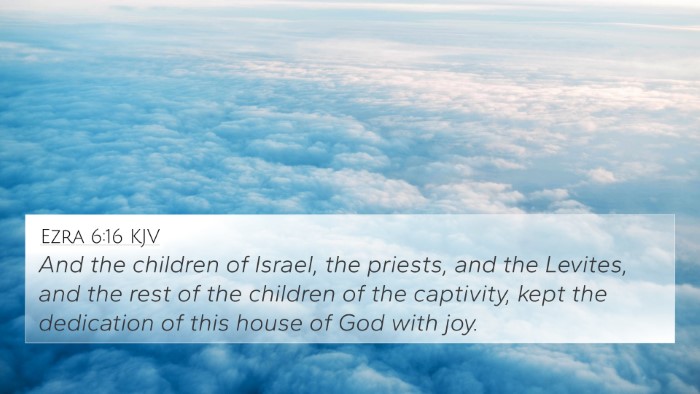Understanding 1 Kings 8:62
Verse Context: In 1 Kings 8:62, King Solomon has just completed the temple and is dedicating it to the Lord. This verse marks a moment of communal devotion and prayer, emphasizing Solomon’s leadership in leading Israel in worship.
Key Scripture: 1 Kings 8:62 states: "Then the king, and all Israel with him, offered sacrifice before the LORD."
Meaning and Interpretation
This verse highlights several significant themes within biblical interpretation, particularly the importance of collective worship, the role of leadership in religious practices, and the significance of sacrifice in the context of Old Testament worship.
Collective Worship
In 1 Kings 8:62, the act of sacrificial offerings by the king and the people illustrates the unity of Israel in their devotion to God. This collective worship symbolizes national identity and covenant fidelity.
Role of Leadership
Solomon's position as king underscores the responsibility of leaders to guide their people toward God. His actions serve as a model for spiritual leadership within the community, which can be seen in other biblical accounts such as the calls for repentance and prayer from leaders like Nehemiah (Nehemiah 1:4-11).
Significance of Sacrifice
The offering of sacrifices points to the importance of atonement and thanksgiving. In the Hebrew culture, sacrifices were vital expressions of faith and obedience to God’s commandments, reflecting a deeper understanding of holiness and reconciliation.
Cross-References and Thematic Connections
This verse relates to several other scriptures that illuminate its meaning through cross-referencing:
- Exodus 20:24: "An altar of earth you shall make for me." – Relates to the offering sacrifices laid out in the wilderness.
- 2 Chronicles 7:4-5: "Then the king and all the people offered sacrifices before the LORD." – Echoes the dedication ceremony in 1 Kings.
- Psalms 51:17: "The sacrifices of God are a broken spirit." – Highlights the inner condition required for acceptable sacrifice.
- Hebrews 13:15: "Let us continually offer to God a sacrifice of praise." – Reflects the New Testament understanding of sacrifices beyond the ceremonial.
- Leviticus 1-7: Discusses various types of sacrifices, enhancing the understanding of their significance.
- Romans 12:1: "Present your bodies as a living sacrifice." – Links Old Testament practices to Christian living.
- Deuteronomy 12:5-7: Instructions for worship at the place designated by God, similar to Solomon’s actions in the temple.
Connections Between Bible Verses
In studying this verse, it is essential to recognize how it interacts with various parts of the biblical text, leading to a comprehensive understanding:
- Linking Biblical Texts: The narrative in 1 Kings establishes a historical account that connects with prophetic texts, such as Jeremiah, who calls for repentance in the context of temple worship.
- Inter-Biblical Dialogue: The theme of sacrifice in worship recurs through the New Testament, creating a dialogue on the nature of offerings between the Old and New Testaments.
- Comparative Bible Verse Analysis: Comparing the dedication of the temple with the last supper showcases evolving understandings of worship and sacrifice.
Tools and Resources for Bible Cross-Referencing
For those interested in exploring further, various tools for Bible cross-referencing can be beneficial:
- Bible Concordance: Essential for locating keywords and exploring thematic links.
- Cross-Reference Bible Study: Involves examining related texts for deeper understanding.
- Bible Reference Resources: Such as topical Bibles and commentary series that help in identifying connections.
Conclusion
In summary, 1 Kings 8:62 serves as a powerful reminder of communal worship, the role of leadership, and the significance of sacrifice within God's covenant with His people. The connections drawn from various scriptures enhance the understanding of the continuity of themes through the Bible.
As you continue your studies, consider how these themes resonate throughout scripture and how they may apply to modern faith practices.
